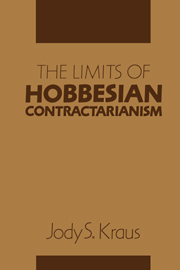6 - The limits of Hobbesian contractarianism
Published online by Cambridge University Press: 05 June 2012
Summary
The contractarian approach to normative questions is distinguished from others in part by its commitment to understanding normative questions as ones amenable to hypothetical analysis, and by its aspiration to derive normative conclusions from uncontroversial premises. If we suppose descriptive propositions to be less controversial or at least in principle more demonstrable than normative ones, then the strongest argument for a normative conclusion will proceed from descriptive premises. As I noted at the outset, however, one of the principal obstacles facing normative theory is the naturalistic gap – the apparent logical gulf between descriptive premises and normative conclusions. If no normative conclusions can be inferred from descriptive premises alone, as Moore's naturalistic fallacy suggests, then the most we can hope for are arguments supporting normative conclusions which proceed from normatively minimalistic premises, premises which though not purely descriptive, are so uncontroversial that they hold force for most people. Such an ambition certainly falls short of the aspiration to build universally compelling normative conclusions from demonstrable premises presupposing no prior normative commitments. But it is no mean feat to support a substantive normative conclusion on grounds to which most people are, or on reflection would be, committed.
Contractarianism does not, then, purport to cross the naturalistic divide. Instead, it offers an array of theories designed to argue from admittedly normative premises to normative conclusions. Within the contractarian tradition, theories range from those which presuppose highly controversial and complex normative premises (i.e., normatively idealistic theories employing idealistic constructionism in the design of their hypothetical setting), to those which presuppose relatively uncontroversial and theoretically simple normative premises (i.e., normatively minimalistic theories employing realistic construction in the design of their hypothetical setting).
- Type
- Chapter
- Information
- The Limits of Hobbesian Contractarianism , pp. 310 - 320Publisher: Cambridge University PressPrint publication year: 1993
- 2
- Cited by



